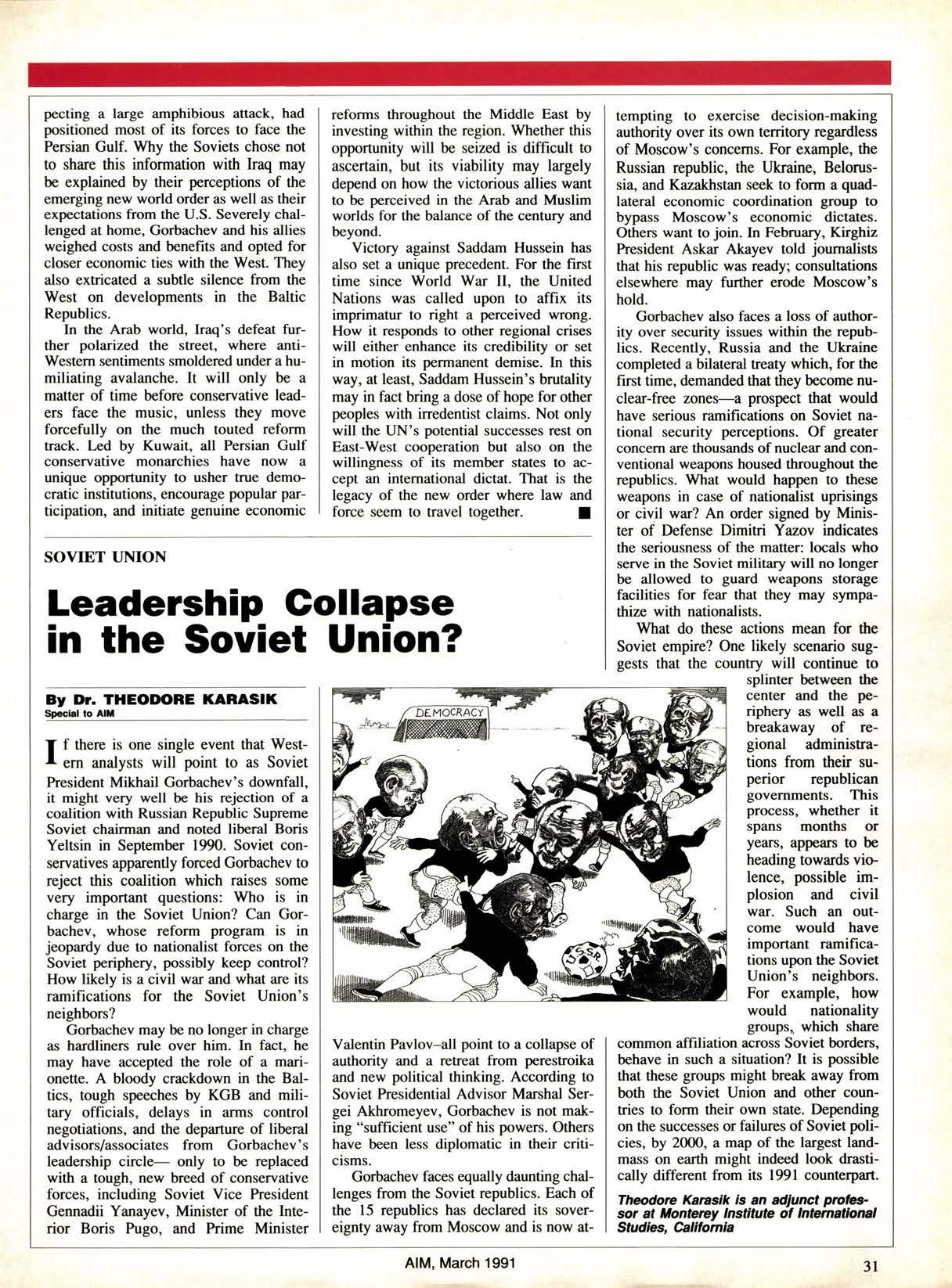
2 minute read
Leadership Gollapse in the Soviet Union?
By Dr. TIIEODORE KABASIK
SDdd to AlI
Advertisement
f f there is one single event that Westr ern analysts will point to as Soviet President Mikhail Gorbachev's downfall, it might very well be his rcjection of a coalition with Russian Republic Supreme Soviet chairman and noted liberal Boris Yeltsin in September 1990. Soviet conservatives apparently forced Gorbachev to reject this coalition which raises some very important questions: Who is in charge in the Soviet Union? Can Gorbachev, whose reform program is in jeopardy due to nationalist forces on the Soviet periphery, possibly keep control? How likely is a civil war and what are its ramifications for the Soviet Union's neighbors?
Gorbachev may be no longer in charge as hardliners rule over him. tn fact, he may have accepted the role of a marionette. A bloody crackdown in the Baltics, tough speeches by KGB and military officials, delays in arms control negotiations, and the departure of liberal advisors/associates from Gorbachev's leadership circle- only to be replaced with a tough, new breed of conservative forces, including Soviet Vice President Gennadii Yanayev, Minister of the Interior Boris Pugo, and Prime Minister
Valentin Pavlov-all point to a collapse of authority and a retreat from perestroika and new political thinking. According to Soviet Presidential Advisor Marshal Sergei Akhromeyev, Gorbachev is not making "sufficient use" of his powers. Others have been less diplomatic in their criticisms.
Gorbachev faces equally daunting challenges from the Soviet republics. Each of the 15 republics has declared its sovereignty away from Moscow and is now at- tempting to exercise decision-making authority over its own territory regardless of Moscow's concems. For example, the Russian republic, the Ukaine, Belorussia, and Kazakhstan seek to form a quadlateral economic coordination group to bypass Moscow's economii dictates. Others want to join. In February, Kirghiz President Askar Akayev told joumalists that his republic was ready; consultations elsewhere may further erode Moscow's hold.
Gorbachev also faces a loss of authority over security issues within the repub. lics. Recently, Russia and the Ukraine completed a bilateral treaty which, for the first time, demanded that they become nuclear-free zones-a prospect that would have serious ramifications on Soviet national security perceptions. Of greater concem are thousands ofnuclear and conventional weapons housed throughout the republics. What would happen to these weapons in case of nationalist uprisings or civil war? An order signed by Minister of Defense Dimitri Yazov indicates the seriousness of the matter: locals who serve in the Soviet military will no longer be allowed to guard weapons storage facilities for fear that they may sympathize with nationalists.
What do these actions mean for the Soviet empire? One likely scenaxio suggests that the country will continue to splinter between tlre center and the periphery as well as a breakaway of regional administrations from their superior republican govemments. This process, whether it spans months or years, appears to be heading towards violence, possible implosion and civil war. Such an outcome would have important ramifications upon the Soviet Union's neighbors. For example, how would nationality groups,. which share common affiliation across Soviet borders, behave in such a situation? It is possible that these groups might break away from both the Soviet Union and other countries to form their own state. Depending on the successes or failures of Soviet policies, by 2fiD, a map of the largest landmass on earttr might indeed look drastically different from its l99l counterpart.
Tlwdore Kansik is an adjunct ptot+ sor et Uonterey lnstitute of lntilEbml Sludhs, Calltomla










